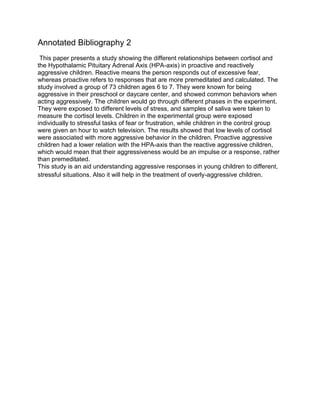Report
Share

Recommended
Infant parasympathetic and sympathetic activity during baseline, stress and r...

Infant parasympathetic and sympathetic activity during baseline, stress and r...BARRY STANLEY 2 fasd
Parental stress, affective symptoms and marital satisfaction in parents of ch...

Parental stress, affective symptoms and marital satisfaction in parents of ch...James Cook University
Recommended
Infant parasympathetic and sympathetic activity during baseline, stress and r...

Infant parasympathetic and sympathetic activity during baseline, stress and r...BARRY STANLEY 2 fasd
Parental stress, affective symptoms and marital satisfaction in parents of ch...

Parental stress, affective symptoms and marital satisfaction in parents of ch...James Cook University
More Related Content
Similar to Annotated bibliography #2
Similar to Annotated bibliography #2 (20)
Cortisol dopamine, and pediatric aggression review paper

Cortisol dopamine, and pediatric aggression review paper
JOURNAL OF APPLIED BEHAVIOR ANALYSISSETTING GENERALITY AND.docx

JOURNAL OF APPLIED BEHAVIOR ANALYSISSETTING GENERALITY AND.docx
TABLE 2-4 Types of ResearchResearch MethodDescriptionExample.docx

TABLE 2-4 Types of ResearchResearch MethodDescriptionExample.docx
Emociones apego ariculo ingléskochanska cd-attach_emot

Emociones apego ariculo ingléskochanska cd-attach_emot
Due Monday August 22, 2016 8am $40.00 please be 100 original OP.docx

Due Monday August 22, 2016 8am $40.00 please be 100 original OP.docx
AQA Psychology A Level Revision Cards - Attachment Topic

AQA Psychology A Level Revision Cards - Attachment Topic
392STUDYING CHILD DEVELOPMENTo me, research is disco.docx

392STUDYING CHILD DEVELOPMENTo me, research is disco.docx
More from gustavomartinezmuniz
More from gustavomartinezmuniz (14)
Comparison of the forests of puerto rico= yunque bosque seco

Comparison of the forests of puerto rico= yunque bosque seco
Annotated bibliography #2
- 1. Annotated Bibliography 2 This paper presents a study showing the different relationships between cortisol and the Hypothalamic Pituitary Adrenal Axis (HPA-axis) in proactive and reactively aggressive children. Reactive means the person responds out of excessive fear, whereas proactive refers to responses that are more premeditated and calculated. The study involved a group of 73 children ages 6 to 7. They were known for being aggressive in their preschool or daycare center, and showed common behaviors when acting aggressively. The children would go through different phases in the experiment. They were exposed to different levels of stress, and samples of saliva were taken to measure the cortisol levels. Children in the experimental group were exposed individually to stressful tasks of fear or frustration, while children in the control group were given an hour to watch television. The results showed that low levels of cortisol were associated with more aggressive behavior in the children. Proactive aggressive children had a lower relation with the HPA-axis than the reactive aggressive children, which would mean that their aggressiveness would be an impulse or a response, rather than premeditated. This study is an aid understanding aggressive responses in young children to different, stressful situations. Also it will help in the treatment of overly-aggressive children.